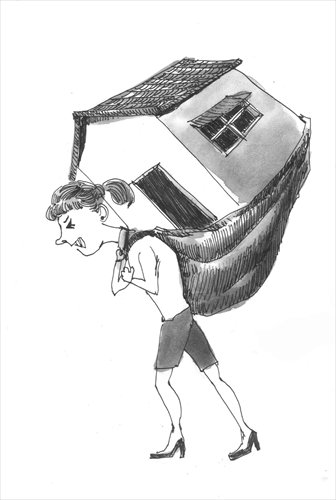Are you prepared to be a house slave?

Illustration: Luo Xuan/GT
I behaved like two different people before and after I decided to buy a home in Beijing.
Before, I used to look down upon clothes sold on Taobao and always went shopping in downtown malls. Once I sensed a dress was meant to be on me, I took out my credit card without any hesitation. I was also a foodie. When weekends came, I carefully listened to my stomach. Whatever delicious food I wanted, I went out and got.
After my property buying decision was made, this all changed.
Or at least it did in my mind, since I was imagining what my life would be like if I bought a home in Beijing.
Recently, I went to a property sales center in Tongzhou district. Even though it is outside the Fifth Ring Road, the property price has gone up to about 30,000 yuan ($4,800) per square meter.
The smallest new apartment available for me, a single young woman, is 67 square meters, and the saleswoman helped me do the math - if I pay 600,000 yuan as the down payment, my monthly payment will be 7,800 yuan. The government housing fund can help a bit, but deducting the monthly payment, I guess I have only about 2,000 yuan left every month, which means that most of the time I can only do window shopping, cannot go out for dinner regularly, must stay healthy to keep the doctors away, and last but not least, I must keep my job.
The huge pressure as a house slave began to gradually swallow me, even though I am not a real one yet.
"The price keeps rising. As long as you want to stay in Beijing, better to buy a home earlier than later," suggested many of my friends.
But the situation of several real house slaves around me has been dreadful enough, and cannot be countered by the potential advantage in purchasing property early.
My friend Wei Fan, 30, paid 420,000 yuan as down payment for a 59-square meter property in Fangshan district in 2012 worth 900,000 yuan in total.
Though relatively cheap compared with those in downtown areas, for a single woman whose monthly salary was 3,000 yuan, the 2,600-yuan monthly payment is a significant burden.
Wei, in her own way, demonstrated how to be a successful house slave.
She does a part-time job in an English training center every weekend to make ends meet; she purchases vegetables and meat from cheap markets and cooks three meals every day while never even stepping foot into restaurants.
One day, Wei, who could not resist the lure of food in restaurants any longer, gave me a call, begging me to treat her to dinner in an elegant restaurant. How could I say no to a house slave going through such hardship?
During lunch, she posed a question while eating with her mouth full, "You know what? I only bought something new once over the last six months after I bought the property."
I was shocked when I found out what her sole purchase had been - a pair of socks.
Wei still encouraged me to buy a property soon.
But one would not keenly feel a thing until it happened to her.
When Wei told me money can be saved with 20-yuan bills one by one, I didn't take it as the truth.
But imagining the days after I purchase a property, it is not impossible that I will save up money in 10-yuan bills one by one.
Life is always what you choose.
Maybe I still have to double check whether I am prepared to be a house slave.
This article was published on the Global Times Metropolitan section Two Cents page, a space for reader submissions, including opinion, humor and satire. The ideas expressed are those of the author alone, and do not represent the position of the Global Times.